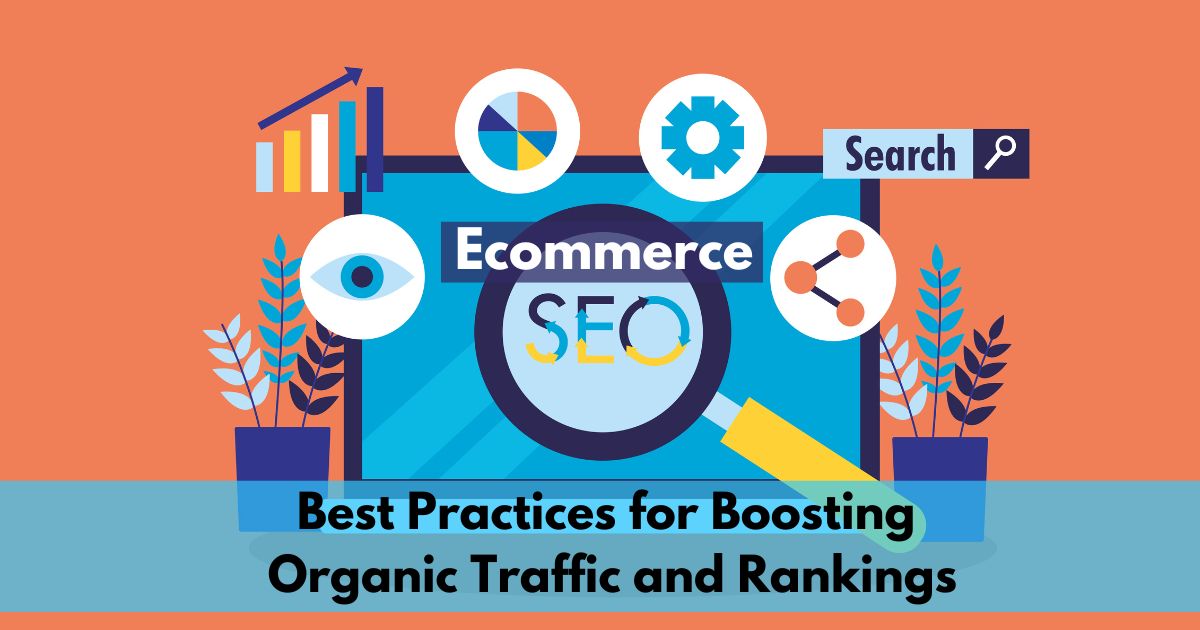- May 11, 2023
- by admin
- Ecommerce SEO
- 0 Comments
In today’s digital world, having a good ecommerce website is super important for businesses. This is because more people are shopping online than ever before. If you have an online store SEO, you can reach more customers, make your brand more well-known, and increase sales.
In this article, we will talk about why having a good ecommerce website is so important, and how you can make your website better. We will also explore how Ecommerce SEO can help you improve your visibility and drive more traffic to your site. Ultimately, leading to increased sales and revenues.
So, let’s begin now!
What Is Ecommerce SEO?
Ecommerce SEO refers to the process of optimizing an online retail store to improve its visibility and ranking on google. It involves optimizing the website’s design, content, and structure to improve its relevance and authority in the eyes of search engines like Google, Bing, or Yahoo.
SEO for ecommerce requires a deep understanding of search engines’ algorithms, user intent, and online buying behavior. It includes keyword research, on-page optimization, technical SEO, content creation, and link building, among other tactics.
SEO for ecommerce is about making online stores more visible and attractive to customers. To do this, it’s not enough to just use keywords and write good content. Ecommerce SEO also means making sure the website is easy to use and that it guides customers toward making a purchase.
It also involves understanding who the target audience is and what they expect from an online shopping experience. Building brand awareness and using social media to promote the store are also important parts of ecommerce SEO.
What are the Best Practices for Ecommerce SEO?
Your ecommerce business needs to have a strong online presence to attract customers and drive sales. With millions of online retailers competing for attention, it can be challenging to stand out from the crowd. However, with the right SEO strategies, you can increase your visibility in search results. You can also drive more traffic to your site.
Some are the best practices to elevate your online business are discussed below:
The Art of Keyword Research for Ecommerce SEO

Keyword research is an important step in ecommerce seo for online retailers. As an online business owner, you must be aware of the importance of in-depth keyword research for your business.
But before going into a long discussion about keyword research, you must know the search intent behind any keywords. Keyword intent refers to the underlying purpose or motivation behind a user’s search query.
Based on the user’s search query, there are two types of keywords intent:
Informational Intent of a Keyword
Informational keyword intent is a type of search query. It refers to when a user is looking for information or answers to a specific question rather than seeking to make a purchase or take a specific action.
Here the main purpose of the user is to understand more about your niche, rather than making a purchase. For example, the best keywords for such a purpose can be “Best Ways to Train for a Marathon”, “Benefits of Meditation” and many more.
Commercial Intent of a Keyword
The second type of search query is commercial keyword intent. Commercial keyword intent is when a user searches for a product or service with the intent to purchase.
These users are typically in the consideration or evaluation stage. They are looking to compare and evaluate different options before making a purchase decision.
How to Pinpoint Keyword Intent?
Determining user search intent is crucial for effective keyword analysis and SEO. To make this process less daunting, it’s important to break it down into three stages:
Analyzing SERPs: Start by analyzing search engine results pages (SERPs) for your target keywords. Pay attention to the different types of results that show up, including paid ads, knowledge graph results, and organic listings. This will give you insights into the types of content that are already ranking well and what users are searching for.
Look at Google Ads for Commercial Intent: By examining Google Ads, you can gain an understanding of how competitive keywords are and what their commercial intent might be. Look for keywords with high bid prices as they are likely to have strong commercial intent.
Review Your Analytics: Finally, look at your website analytics to gain insights into how users interact with your content. Look for pages with high bounce rates as they may indicate that the content does not match the search intent of the user. Use this information to adjust your content strategy and optimize your pages for better user engagement and SEO.
E-Commerce Site Architecture for Better SEO
Ecommerce site architecture refers to the structure and organization of pages on an online store website. It involves creating a hierarchy of pages, categorizing products, and creating a logical flow of navigation for users to easily access the desired content.
Properly structuring your e-commerce site architecture is essential for effective SEO. It helps search engines crawl and index your pages more efficiently. Finally, leading to higher search engine rankings and more organic traffic.
To optimize your e-commerce site architecture for better SEO, here are some best practices to consider:
Create a logical hierarchy of pages: Organize your website into a hierarchy of pages, with your homepage at the top, followed by secondary pages (such as category pages), and tertiary pages (such as product pages). This creates a clear structure that search engines and users can easily follow.
Use breadcrumb navigation: Breadcrumb navigation is a type of secondary navigation that helps users and search engines understand the structure of your website. It allows users to easily navigate back to previous pages and helps search engines understand the hierarchy of your pages.
Categorize products: Group your products into categories and subcategories to create a clear structure for your website. This not only makes it easier for users to find what they are looking for but also helps search engines understand the relevance of your pages.
Ensure page depth is limited: Limit the depth of your pages to ensure that every page is easily accessible within a few clicks from your homepage. This will help users find what they are looking for quickly. It will also ensure that search engines can crawl and index your pages more efficiently.
On-page SEO for Online Stores
On-page SEO refers to the process of optimizing individual pages on a website to improve their search engine rankings. It involves optimizing various elements on a page.
Some of these elements are discussed below in detail:
1). The Page Title Optimization
Page title optimization refers to the process of creating a relevant and compelling title tag for a webpage. It’s used to improve its search engine rankings and drive more organic traffic. You can optimize your title tag by using the target keyword.
Additionally, add a modifier in the title tag to make it more attractive and engaging. For example, our long tail keyword is “what is ecommerce seo?” Then our modifier for this keyword can be:
- The Ultimate Guide to
- Everything You Need to Know About
- Secrets of Successful
- Boost Your Online Sales with
- Tips and Tricks for
- The Beginner’s Handbook to
- The Definitive Guide to
- Mastering Ecommerce SEO:
- Insider Strategies for
By adding one of these modifiers to the long-tail keyword, the resulting title tag can be more compelling and informative for search engine users
2). Meta Description Optimization
Another important component of on-page optimization is the meta description. The meta description tag is a short summary of the content on a web page that appears below the title tag in search engine results.
To optimize the meta description tag, you can use modifiers that make it more engaging and informative. Using the words like “discover”, “learn”, “get”, “find” and “explore” will encourage the user to click through your page. Also, you can highlight the benefit of your content by using phrases like “Increase your”, “boost your” and “Improve your” etc.
3). Optimize your Content for Ranking
It is noted that 1000+ words have a greater chance of getting ranked on google. The purpose is you want google to understand what your product is. So, long content will explain it better to google. Moreover, long content is beneficial from the user’s point of view. They will clearly understand what kind of purchase they are going to make.
If you created a long content, then sprinkle your target keyword 3-5x and spread them evenly in the whole body of the content.
4). Internal Linking
Internal linking connects one page of a website to another within the same site. It helps users navigate, establishes a hierarchy, and distributes authority and ranking power.
Technical SEO for Ecommerce Optimization
Technical SEO for ecommerce refers to optimizing the technical aspects of an online store’s website. This includes optimizing website speed, mobile-friendliness, structured data, URL structure, canonicalization, and other technical factors. All these are such factors that affect how search engines crawl and index ecommerce websites.
Technical SEO ensures that search engines can easily access and understand the website’s content, resulting in better search engine rankings and increased traffic to the site.
Content Marketing for Ecommerce SEO

The final step is to market your content or product to the right audience, which will drive traffic to your site. The first step in content marketing is to find the right audience. For an ecommerce website selling certain types of products, identifying your target audience is crucial.
In the second step, identify the search queries of your users, i.e., what they are searching for most of the time. Finally, create outstanding content around that specific keyword.
Final Thoughts
In this blog post, we discussed in detail the best practices for SEO for ecommerce sites. Follow these guidelines to make your website stand out from the competition in Google search results.
However, if you find it challenging, you can always contact our Ecommerce SEO consultants. Our team is highly knowledgeable about Google’s latest trends and ranking algorithms. Hire us now and take your online store to the next level.



